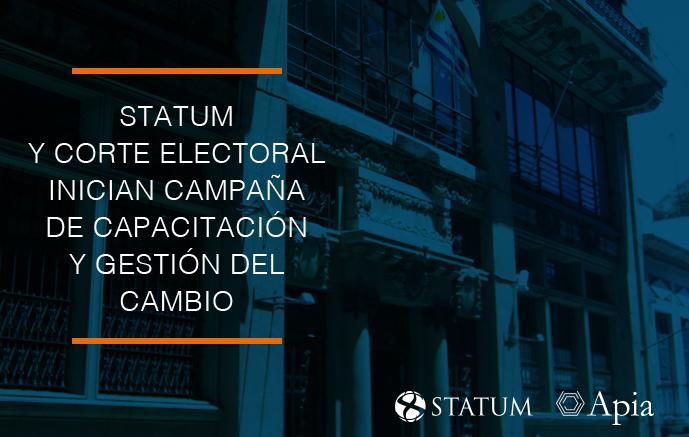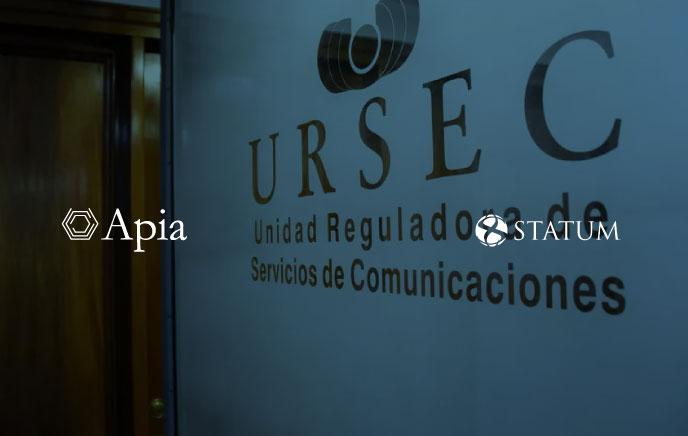STATUM y Corte Electoral inician campaña de capacitación y gestión del cambio
Resumen:
La implementación de ApiaDocumentum está prevista para fines de octubre.
Información:
A finales de agosto de 2018, STATUM iniciará la capacitación del personal de la Corte Electoral, próximo organismo a sumarse al sistema de expediente electrónico ApiaDocumentum. En principio, 50 funcionarios serán instruidos en el manejo de la herramienta y luego estos replicarán los conocimientos hasta alcanzar el total de la plantilla, la que supera las 800 personas en toto el territorio nacional. Se estima que la capacitación dure dos meses. Por otra parte, la implementación de la plataforma está prevista para fines de octubre.
ApiaDocumentum es una solución pensada para gestionar expedientes, documentos y flujos de trabajo, soportados electrónicamente. Su objetivo es eliminar el soporte papel, mejorar la calidad del servicio y conseguir la transparencia y democratización de la información.
Como esto implica un fuerte cambio en las tareas laborales cotidianas y, en este caso en particular, la edad promedio del personal de la Corte Electoral es alto, el proceso de relevamiento, capacitación y puesta en producción que están llevando a cabo el organismo, STATUM y Agesic se apoya fuertemente en diversas actividades de gestión del cambio para minimizar el posible rechazo que el nuevo sistema informático puede generar en etapas tempranas.
“La implementación será exitosa en la medida en que las personas lo sientan suyo al sistema de Expediente Electrónico y vean que los beneficios son mayores que los costos”, dijo Alfredo Minchilli, consultor en Gestión Humana, Desarrollo y Cambio Organizacional.
En este sentido, Minchilli enfatizó que, a través de la capacitación, se busca identificar los sentimientos de miedo y ansiedad del personal generados por la nueva herramienta para suplirlos por conocimientos técnicos, pero también por la comprensión de porqué es necesario el cambio operativo.
“La clave está en entender las resistencias para gestionarlas”, afirmó el especialista. Y añadió: “Es un proyecto muy intenso. En un mes ya participaron más de 100 personas”.
En el camino hacia la implementación de ApiaDocumentum en la Corte Electoral, la gestión del cambio implica entrevistas con actores claves (desde los ministros del organismo, mandos medios, hasta funcionarios a nivel operativo) para entender la perspectiva que cada uno tiene del proyecto, así como también para entender las posibles dificultades. También implica talleres con el personal, incluso con los jefes y subjefes de todas las oficinas departamentales. “El objetivo es construir juntos la visión del cambio que inspira el proyecto”, comentó Minchilli.
La implementación de ApiaDocumentum está prevista para fines de octubre.
Información:
A finales de agosto de 2018, STATUM iniciará la capacitación del personal de la Corte Electoral, próximo organismo a sumarse al sistema de expediente electrónico ApiaDocumentum. En principio, 50 funcionarios serán instruidos en el manejo de la herramienta y luego estos replicarán los conocimientos hasta alcanzar el total de la plantilla, la que supera las 800 personas en toto el territorio nacional. Se estima que la capacitación dure dos meses. Por otra parte, la implementación de la plataforma está prevista para fines de octubre.
ApiaDocumentum es una solución pensada para gestionar expedientes, documentos y flujos de trabajo, soportados electrónicamente. Su objetivo es eliminar el soporte papel, mejorar la calidad del servicio y conseguir la transparencia y democratización de la información.
Como esto implica un fuerte cambio en las tareas laborales cotidianas y, en este caso en particular, la edad promedio del personal de la Corte Electoral es alto, el proceso de relevamiento, capacitación y puesta en producción que están llevando a cabo el organismo, STATUM y Agesic se apoya fuertemente en diversas actividades de gestión del cambio para minimizar el posible rechazo que el nuevo sistema informático puede generar en etapas tempranas.
“La implementación será exitosa en la medida en que las personas lo sientan suyo al sistema de Expediente Electrónico y vean que los beneficios son mayores que los costos”, dijo Alfredo Minchilli, consultor en Gestión Humana, Desarrollo y Cambio Organizacional.
En este sentido, Minchilli enfatizó que, a través de la capacitación, se busca identificar los sentimientos de miedo y ansiedad del personal generados por la nueva herramienta para suplirlos por conocimientos técnicos, pero también por la comprensión de porqué es necesario el cambio operativo.
“La clave está en entender las resistencias para gestionarlas”, afirmó el especialista. Y añadió: “Es un proyecto muy intenso. En un mes ya participaron más de 100 personas”.
En el camino hacia la implementación de ApiaDocumentum en la Corte Electoral, la gestión del cambio implica entrevistas con actores claves (desde los ministros del organismo, mandos medios, hasta funcionarios a nivel operativo) para entender la perspectiva que cada uno tiene del proyecto, así como también para entender las posibles dificultades. También implica talleres con el personal, incluso con los jefes y subjefes de todas las oficinas departamentales. “El objetivo es construir juntos la visión del cambio que inspira el proyecto”, comentó Minchilli.





Comentarios (0)
Deja un comentario